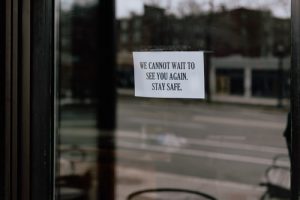Virginia lags in implementing extended unemployment benefits

When registered nurse Amanda Marsh lost her job working from her Virginia home as a health plan medical reviewer late last year, unemployment benefits helped support her family while she looked for work.
Those ran out in March, so when she found out the coronavirus relief bill that Congress passed around the same time contained a provision providing up to 13 extra weeks of benefits to people like her, she was relieved.
But Marsh is still waiting, along with tens of thousands of Virginians who the state says are eligible for the Pandemic Emergency Unemployment Compensation program. The Virginia Employment Commission hasn’t gotten the program off the ground yet — and doesn’t expect to until July.
“It blows my mind that they think people can live that long with no income,” said Marsh, who described making ends meet thanks to money from selling her previous home. The Pittsylvania County resident with two young children said she’s had a hard time finding a new job at a time when health care companies have been furloughing workers.
As of early this week, Virginia was one of 19 states that have yet to start making payments under the PEUC program, according to the U.S. Labor Department.
And Virginia appears to be among a handful of states moving particularly slowly to implement the benefits, according to an Associated Press review of public statements by state employment agencies. Of the states not yet making payments, many have said they expect to start taking applications by the end of May.
“The program exists on paper, but the bills are real and the money’s not there. And, you know, that’s a huge problem for folks,” said Pat Levy-Lavelle, an attorney with the the Legal Aid Justice Center in Richmond.
Across the U.S., roughly 41 million people have sought jobless aid since the coronavirus first prompted businesses to close down and shrink their workforces, the government said Thursday. All told, the figures point to a job market gripped by its worst crisis in decades.
In Virginia, the unemployment rate has reached 10.6%. Nearly 59,000 Virginians filed initial unemployment claims last week, according to federal data, marking a reversal in a six-week run of falling totals.
Virginia’s employment commissioner, Ellen Marie Hess, told lawmakers during a Senate committee meeting last week that the agency expects to begin making payments under the federally funded PEUC program in July but did not elaborate.
The program is separate from the $600 weekly federal payments that can go to anyone in the country who has lost a job. The extra 13 weeks under the PEUC program would kick in only after recipients exhaust their unemployment compensation, so many of those who qualify at this point lost their jobs long before the coronavirus took hold in the U.S. and presumably could be in greater need of help.
The commission estimates about 25,000-30,000 people are eligible, spokeswoman Joyce Fogg said. Fogg said the agency’s IT department is working on reprogramming a system first implemented in 1985 to accept applications, and the agency hopes to have it ready no later than July 2. She later wrote in an email that the commission doesn’t have an exact date, and she did not explain the change.
Fogg said the commission — which, like other employment agencies around the county, has been dealing with a staggering number of unemployment claims — has had to work through implementing the coronavirus relief bill in phases.
“Text messages will be sent when the application is available,” she wrote in an email.
Marsh and others say they have encountered trouble reaching anyone over the phone — a long-running complaint — getting accurate information or even a start date for the program. On Thursday, the website said additional information “concerning the process to claim the PEUC benefits will be forthcoming soon.”
George Inge, who was laid off in May 2019 from a small medical device sales company, said he has been given conflicting information from various employment commission workers about which type of benefit he might qualify for. Inge said the most recent information he has received was that he is eligible for PEUC, although the employee he spoke with said she didn’t know much about the program or when it would be running.
“I really don’t know what they are doing other than they are pitifully slow and I pray everyone will hear this week and get money this week,” one employment commission employee wrote to Inge in an email he provided to AP. “And you are right it is a waiting game.”
Inge, a father of three, including one in college, said his family is barely getting by and might consider listing their Crozet home soon if nothing changes.
Hina Latif, a 32-year-old who was laid off last year from aerospace and defense company General Dynamics, exhausted her unemployment benefits and has also been waiting for information about PEUC. Latif said her family is doing OK because they’ve cut back their spending and her husband, an attorney, is still employed. But she said others in a less fortunate situation could quickly be pushed into poverty.
“I think it’s the duty of our institutions, specifically the VEC, to work effectively in a situation like this,” she said. “And the fact that we were not ready … it unveils the impairments of our society.”
(PHOTO: Unsplash)

